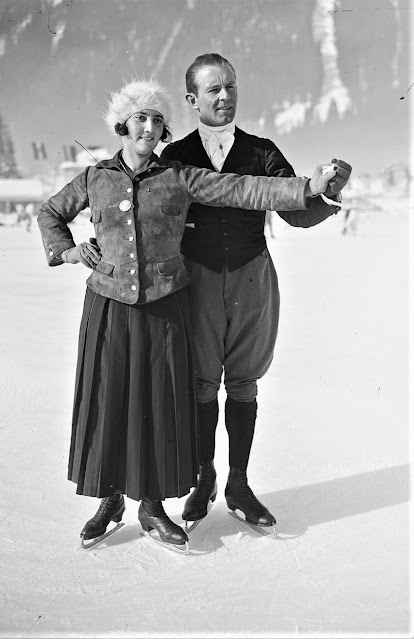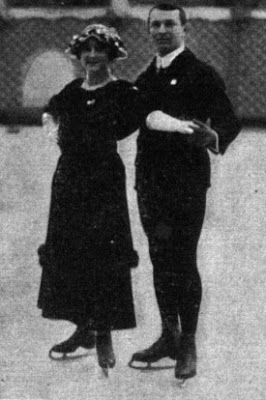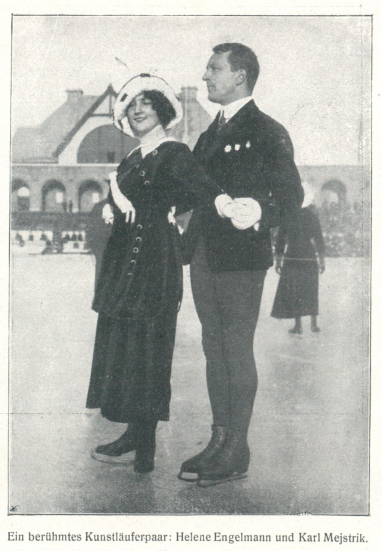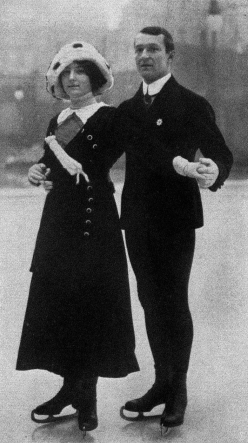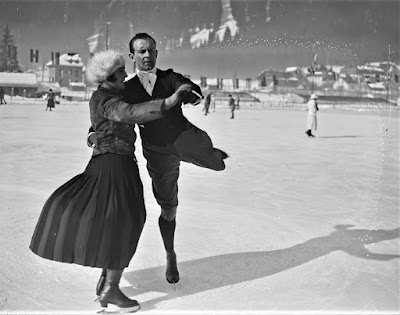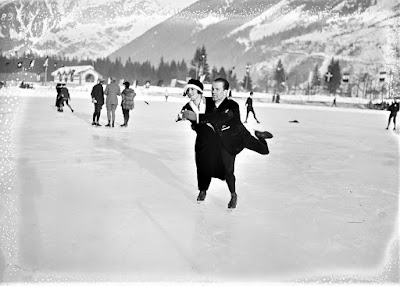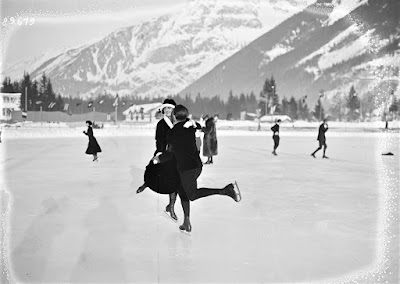Helene Engelmann and Alfred Berger. Photo courtesy Bibliothèque nationale de France.
"When comparing pair skating from then and now... you must admit that today's pair skating is much more difficult, but also more beautiful. Mainly because of the interspersed solo figures, then also through the artistic skill, lifting figures, jumps and various pirouettes. If I'm honest, I like it better than earlier and I am convinced that pairs will continue to develop." - Helene Engelmann, "Der Wiener Tag", December 25, 1937
Helene Engelmann was born February 9, 1898 in Vienna, Austria. To say that she came from Vienna's most important skating family would be something of an understatement. When her father Eduard Engelmann Jr. was four, her grandfather Eduard Engelmann Sr. had taken him to see Jackson Haines perform. Her grandfather went on to construct his famous Engelmann ice rink, where her father trained to win three consecutive European titles from 1892 to 1894. Her aunt Christa von Szabó was the winner of the pairs competition at the Nordic Games in 1901. Olympic Gold Medallist and seven-time World Champion Herma Szabo was her cousin and two-time Olympic Gold Medallist and seven-time World Champion Karl Schäfer was married to her sister Christine.
Helene started skating as a very young child on her family's ice rink in Hernals. When she was only eleven years old, trainer Pepi Weiß-Pfändler paired her with an experienced older skated named Karl Mejstrik. With his first partner Helene Kuich, Karl had finished second at a pairs competition held in conjunction with the World Championships for men in 1908 in Troppau. Karl was an all-around sportsman who held memberships with the Wiener Regatta-Verein and Wiener Eissport-Klub, excelled in skiing and worked as a trainer at the 'Danube' rowing club.
Early in their partnership, Helene and Karl entered only waltzing competitions, winning first prize in a contest put on by the Wiener Akademischen Sportvereines in 1911. The "Allgemeine Sport-Zeitung" claimed this was because Helene was still "technically too weak" to do pairs. In 1912, Karl gave up his singles skating to focus on pairs and in one winter Helene "developed the utmost diligence and colossaly improved her technique within a short time." The duo won the Troppauer Challenge-Preis and in 1913, made history as the first Austrian pairs team to win the World Championships. It was their first time competing in an ISU Championship and the first time couples from Austria had entered an official World Championship in pairs skating. At the age of fifteen in 1913, Helene is still (to this day) the youngest skater ever to win a World pairs title.
Helene described the experience of winning her first World title in an article that appeared in "Der Wiener Tag" on Christmas Day, 1937: "I have, in my athletic career, experienced some things a lot of things that were beautiful and some things that hurt. I remember some things as if they happened only yesterday; some other things lie in a gray, gray distance. My first success in the World Championships remains very close in my memory. It was in Stockholm on February 10, 1913. Why I have the date so precisely is because the day before, I had celebrated my birthday. On the day before the World Championships, I was with my father and partner Mejstrik at the Stockholm theater and I was thirsty to celebrate the day. I felt it very important that I drink the first glass of champagne. No sooner had I been served a such a small glass, then it was time to go to bed. That was actually the one great disappointment to me. I had expected much more from the champagne. My father was not to be trifled with. 'You have one difficult day ahead of you tomorrow, Helene. March to bed.' With a smiling face and a bleeding heart I said goodbye to the 'old people' who continued to still celebrate my birthday. Very early on February the 10th, I was woken by by father and we drove out into the bay, where the compulsory figures for men and women took place. The ice was terribly soft and bad after. At noon, when the freestyle skating was held in the Stockholm stadium - on natural ice - it was better then. My champagne grief from the day before was not forgotten. For that, I was terribly upset and excited. My partner Mejstrik spoke to me of the hype already used. 'I don't know who is in front of us or who skates after us. All I know is that we are against the long-time champion couple... The Jakobsson's were viewed as the winning pair. I was trembling with excitement like a poodle pulled out of ice water and Mejstrik had it not easy to calm me down before skating. And then it was our turn. According to a Viennese waltz, we had our program built. With the first sounds of music, every trace of nervousness had left me and I skated hand in hand with my partner - back then there were no solo figures for pairs skaters - as if there were no judges, no viewers, just the two of us on the big ice surface. It was like a dream. I stopped skating on because the music was over and then was sent by my father back to the hotel. He promised he would tell me immediately of the result of the competition. Excited, I sat in the lobby near Mejstrik, as the phone rang the bell. I followed the expression of the hotel porter on the telephone early. He said to us in broken German: 'Zerr woman... first! Mr.... and Mrs... first.' So the married couple Jakobsson had won first prize. Mejstrik told me that I was very good and he was very pleased with me. I would have so much liked to come home a World Champion. Maybe I cried too. I do not know anymore. Then my father came. I do not know why, but I was ashamed of him. He was so convinced that we would take first place and win - and now I had been deceived. 'So, how's the new World Champion doing?' was his greeting. Wasn't that impossible? It could not be. 'Mr... Mrs... first.' Those words could still be heard clearly in my ears and only gradually did I realize that meant Mejstrik and me. It occurred to me too that the smile of the doorman was an embarrassed wish of happiness, with the few broken German words he knew, from the first to know of our victory. That evening I knew that champagne tasted good, but the World Championship win was my happiest birthday gift."
In 1914, Helene and Karl settled for second place behind Ludovika and Walter Jakobsson at the World Championships in St. Moritz. Just when an exciting rivalry between the two top pairs teams in the world was shaping up, it all came to a halt. "Then came the War," recalled Helene. "There was no artificial ice, no evening lighting, no music. Everything was forbidden. My partner moved. The skating world slept for a winter lasting several years."
After The Great War, Helene's trainer Pepi Weiß-Pfändler paired her with Freidl 'Alfred' Berger, an Austrian Champion in both rowing and bobsleigh. Helene remembered, "In 1920 I was, with my new partner Berger, invited to Klagenfurt. We had to rehearse our program without music in the Carinthian capital there was one Peasant band that played marches in the square. We had them play a Strauss at a marching pace. Our program was expanded. There were jumps and also some lifting figures but it was still a real pair program without solo elements. In 1922, we finally came back to the World Championships and competed against the Jakobsson's in Davos. We stayed victorious. What hurt me is that no World Championship medals came [by post]." Helene and Alfred did not compete internationally in 1923, but returned in 1924 to win the gold medals at the Winter Olympic Games in Chamonix, France and World Championships in Manchester, England.
Helene and her skating partners took very different paths after their World Championship wins. Karl Mejstrik went to England, anglicized his name to Charles and taught skating at two London rinks - the Hammersmith Ice Drome and Golders Green Ice Rink. Alfred Berger operated a seed business, married an opera singer and briefly taught figure skating and hockey at the Minto Skating Club in Ottawa. Helene married an engineer named Johann Jaroschka and had a son named Johann Jr. in 1931. Her husband enlisted with the Wehrmacht during World War II and was killed while serving with a Pionier battalion. The Engelmann rink was badly damaged by Allied bombings during the War and afterwards, Karl Schäfer helped rebuild the rink. Helene and her son were involved in the management for several years. Helene lived out her days in Pukersdorf, suffering from dementia and other health issues in her later years. She passed away at the age of eighty-seven on August 1, 1985.
Skate Guard is a blog dedicated to preserving the rich, colourful and fascinating history of figure skating. Over ten years, the blog has featured over a thousand free articles covering all aspects of the sport's history, as well as four compelling in-depth features. To read the latest articles, follow the blog on Facebook, Twitter, Pinterest and YouTube. If you enjoy Skate Guard, please show your support for this archive by ordering a copy of the figure skating reference books "The Almanac of Canadian Figure Skating", "Technical Merit: A History of Figure Skating Jumps" and "A Bibliography of Figure Skating": https://skateguard1.blogspot.com/p/buy-book.html.

